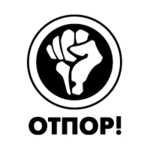أوتپور
Otpor (سيريلية صربية: Отпор!, إنگليزية: Resistance!, stylized as Otpor!) was a political organization in Serbia (then part of FR Yugoslavia) from 1998 until 2004.
In its initial period from 1998 to 2000, Otpor began as a civic protest group, eventually turning into a movement, which adopted the Narodni pokret (the People's Movement) title, against the policies of the Serbian authorities that were under the influence of Slobodan Milošević who at the time was President of Serbia and Montenegro. Following Milošević's overthrow in October 2000, Otpor became a political watchdog organization monitoring the activities of the post-Milošević period of the DOS coalition. Finally, during fall 2003, Otpor briefly became a political party which soon folded due to its failure to pass the 5% threshold needed get any seats in the Serbian parliament.
Founded and best known as an organization employing nonviolent struggle as a course of action against the Milošević-controlled Serbian authorities, Otpor grew into a civic youth movement whose activity culminated on 5 October 2000 with Milošević's overthrow. In the course of a two-year nonviolent struggle against Milošević, Otpor spread across Serbia, attracting in its heyday more than 70,000 supporters who were credited for their role in the 5 October overthrow.[1]
After the overthrow, Otpor launched campaigns to hold the new government accountable, pressing for democratic reforms and fighting corruption, as well as insisting on cooperation with the International Criminal Tribunal (ICTY) at the Hague.[2]
Soon after the 2003 elections, Otpor merged into the Democratic Party (DS).
Initial activity
Otpor was formed in Belgrade on 10 October 1998 in response to a controversial piece of legislation in Serbia — the university law — introduced earlier that year by the Serbian government under Prime Minister Mirko Marjanović. Also, days before Otpor got announced, the government introduced a decree (uredba) outlining special measures in the wake of the ongoing NATO bombing threat. Citing the decree, on 14 October 1998, the government's Ministry of Information headed by Aleksandar Vučić banned the publishing of Dnevni telegraf, Danas, and Naša borba, three Belgrade dailies which were critical of the government to varying degrees.
ذكراها
In addition to contributing to Slobodan Milošević's overthrow, Otpor has become the model for similar youth movements around Eastern Europe.[3] MTV granted Otpor the Free Your Mind award in 2000. There were several award-winning documentaries made about the movement, most notably Making of The Revolution by Eric Van Den Broek and Katarina Rejger (launched at the Amnesty International Film Festival in 2001) and Bringing Down A Dictator by Steve York, which won a Peabody Award in 2002, narrated by Martin Sheen. It has reportedly been seen by over 23 million people around the world.[4]
Otpor members were instrumental in inspiring and providing hands-on training to several other civic youth organizations in Eastern Europe and elsewhere, including Kmara[5] in the Republic of Georgia (itself partly responsible for the downfall of Eduard Shevardnadze), Pora (black)[6][7] (which was part of the Orange Revolution) and Vidsich (opposing the president Viktor Yanukovych) in Ukraine, Zubr[5] in Belarus (opposing the president Alexander Lukashenko), MJAFT![8] in Albania, Oborona[9] in Russia (opposing the president Vladimir Putin), KelKel[7] in Kyrgyzstan (active in the revolution that brought down the president Askar Akayev), Bolga in Uzbekistan[10] (opposing Islam Karimov) and Nabad-al-Horriye[11] in Lebanon. A similar group of students was present in Venezuela against Hugo Chávez. In 2008, an April 6 Youth Movement was founded in Egypt, which facilitated and joined the 2011 Egyptian protests, and took advice from Otpor in the process.[12][13][14]
In 2002, some former Otpor members, most notably Slobodan Đinović and Srđa Popović, founded the Centre for Applied Nonviolent Action and Strategies (CANVAS). This NGO disseminated the lessons learned from their successful nonviolent struggle through scores of trainings and workshops for pro-democracy activists and others around the world, including in Egypt, Palestine, Western Sahara, West Papua, Eritrea, Belarus, Azerbaijan, Tonga, Burma and Zimbabwe as well as labor, anti-war, and immigration rights activists in the United States.[15]
In their search for lessons learned from other activist movements, the حركة شباب 6 أبريل في مصر consulted with Otpor members and adopted some of their strategies in their rallying for the 2011 Egyptian revolution.[13]
In interviews, the leaders and consultants of Otpor have described their involvement in the planning, coordination and implementation of the 2011 "Arab spring" revolutions.[16]
Otpor was an inspiration for SQUELCH!, a satirical political party in the University of California, Berkeley's student government.
انظر أيضاً
- Special operations
- Subversion
- Psyops
- Active measures
- Colour revolution
- From Dictatorship to Democracy
المراجع
- ^ [1]; "The Rise Of Youth Movements In The Post Communist Region", Olena Nikolayenko, Center For Democracy Development, Stanford,19 June 2009
- ^ [2]; "Resistance studies - University of Goetheborgh" November 2010
- ^ Traynor, Ian (2005-06-06). "Young democracy guerrillas join forces". The Guardian: 16. Available at "Archived copy" (PDF). Archived from the original (PDF) on 25 يوليو 2008. Retrieved 29 فبراير 2008.
{{cite web}}: CS1 maint: archived copy as title (link) - ^ Bringing Down A Dictator
- ^ أ ب 60 Revolution In The Revolution Archived 16 يناير 2007 at the Wayback Machine
- ^ Otporaši na Maldivima
- ^ أ ب FLEDGLING YOUTH GROUPS WORRY POST-SOVIET AUTHORITIES Archived 22 فبراير 2008 at the Wayback Machine
- ^ MJAFT! press release Archived 14 أكتوبر 2008 at the Wayback Machine
- ^ Orange People: A Brief History of Transnational Liberation Networks in East Central Europe
- ^ Young democracy guerrillas join forces Archived 5 أكتوبر 2007 at the Wayback Machine
- ^ The new revolutionaries
- ^ Egyptians and Tunisians Collaborated to Shake Arab History The New York Times, 13 February 2011
- ^ أ ب KIRKPATRICK, DAVID; SANGER, DAVID (2011-02-13). "New York Times". New York Times. p. 1. Retrieved 2011-02-13.
{{cite news}}: Unknown parameter|lastauthoramp=ignored (|name-list-style=suggested) (help) خطأ استشهاد: وسم<ref>غير صالح؛ الاسم "New York Times" معرف أكثر من مرة بمحتويات مختلفة. - ^ Gene Sharp: Author of the nonviolent revolution rulebook, BBC News, Ruaridh Arrow, 21 February 2011
- ^ Serbia: 10 Years Later; The Huffington Post, 17 June 2009
- ^ http://www.journeyman.tv/62012/short-films/the-revolution-business.html
- CS1 errors: unsupported parameter
- Short description is different from Wikidata
- Articles containing صربية-language text
- Articles containing إنگليزية-language text
- Pages using Lang-xx templates
- 1998 establishments in Serbia
- Defunct political organizations in Serbia
- Democracy movements
- Nonviolent resistance movements
- Overthrow of Slobodan Milošević
- Political opposition organizations
- Political parties established in 2003
- Youth organizations based in Serbia

